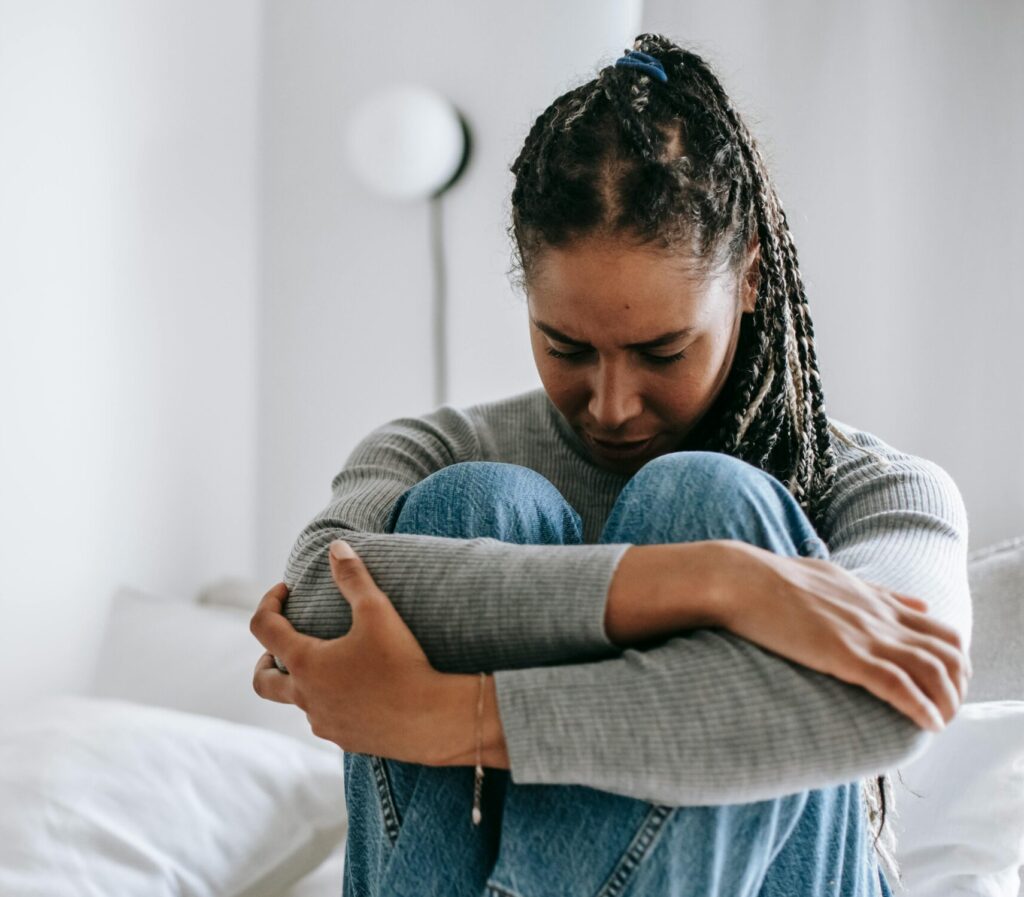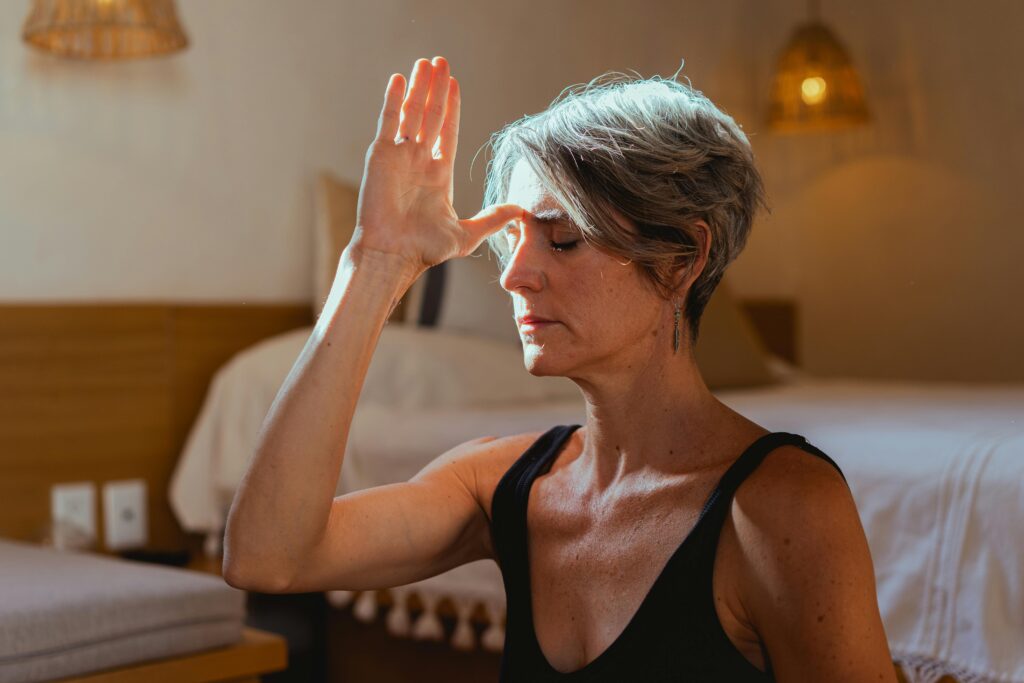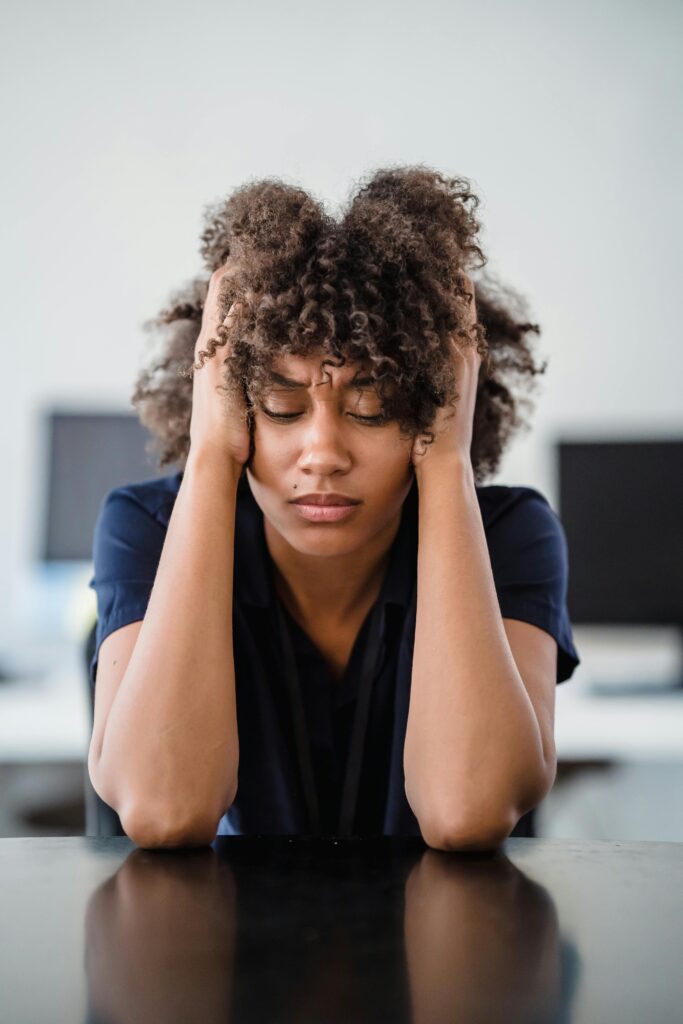Disclaimer: Not everyone who goes through menopause identifies as a woman and not all people who identify as women go through menopause. At Jayla, our core audience is people who identify as women, so we primarily use the word “women.” However, we’re working on specific content for people going through menopause who might not identify as women. Inclusivity is a key value of ours, so bear with us!
How Menopause Can Change How You Feel, Think, Sleep, Look, and Function
Have you been experiencing some changes lately? Have an inkling that it might be perimenopause?
Hot flashes, night sweats, and brain fog are well-known symptoms of perimenopause – the beginning of the transition to menopause. But what you may not know are the many other symptoms that are also associated with menopause. In fact, there are over three dozen symptoms linked to menopause.
From head to toe, seemingly unrelated symptoms may all be related to menopause. That’s because estrogen receptors are everywhere in the body, so when estrogen levels fluctuate and eventually decline during menopause, changes can happen all over.
Definition
Estrogen is a hormone that plays a crucial role in the female body, especially when it comes to reproductive health. Think of it as one of the body’s main messengers, primarily helping to regulate things like the menstrual cycle, fertility, and the development of secondary sexual characteristics like breasts.
Most people won’t experience every single symptom. Instead, we’ll each have our own unique set of menopause symptoms with the luckiest among us not having any. To recognize those symptoms, however, we need to understand just what those symptoms might be.
How Does Menopause Make You Feel Different?
Feeling a bit off? Don’t really know what’s going on? It may be perimenopause or menopause more broadly.
When we refer to menopause in this article, we’re referring to all the stages of menopause: perimenopause, menopause, and postmenopause.
Hot flashes
Hot flashes are the symptom you’ve most likely heard of. That’s not a coincidence: it’s also one of the most common, with between 36% and 87% of menopausal women experiencing this symptom (2).
Hot flashes feel like a sudden wave of warmth washing over your body, often hitting hardest on your face, neck, and chest. If you’re fairer skinned, it can make you turn noticeably red, almost like you’re blushing. These episodes can last anywhere from a few seconds to several minutes and are often accompanied by sweating and, sometimes, heart palpitations.
We don’t fully understand what causes hot flashes yet, but they’re thought to happen because the body’s thermostat gets slightly out of whack due to fluctuating hormone levels (1).
Find relief through:
- Lifestyle changes to stay cool
- A healthy diet and regular exercise routine (this one will come up for most symptoms)
- Wellness therapies like cognitive behavioral therapy, hypnosis, and acupuncture
- Hormone replacement therapy (HRT)
- Low doses of antidepressants, anti-seizure medications, or other medications
Muscle and joint pain
If you’re experiencing joint pain, you’re one of the 48-72% of women who do (2). So, you’re definitely not alone!
Joint pain can feel like your knees, hips, or hands are stiff and achy, making it harder to move around comfortably.
This discomfort is often due to the drop in estrogen levels, as estrogen plays a role in keeping inflammation in check. Without enough estrogen, joints can become inflamed and sore more easily.
Find relief through:
- Gentle exercises like yoga or swimming
- A healthy diet, rich in anti-inflammatory foods
- Hydration
- Physical therapy or massage
- Supplements such as omega-3 fatty acids or glucosamine
- Over-the-counter pain relievers
- Prescription medications if needed
Low libido
During menopause, you may feel like your interest in sex is taking a nosedive, and this can be really frustrating. Over one in three menopausal women report having sexual difficulties, from lack of interest in sex to trouble having an orgasm (5).
The drop in our reproductive hormones plays a big role in the decrease in our sexual desire. Additionally, other symptoms such as vaginal dryness and weaker pelvic floor muscles (explained below) may also contribute to low libido.
Find relief through:
- Open communication with your partner
- Hormone replacement therapy (HRT)
- Use of lubricants or vaginal moisturizers
- Emotional intimacy and quality time together
- A healthy diet and regular exercise
- Stress management techniques like meditation or deep breathing
- Counseling or sex therapy if needed
Itchy skin
Itchy skin is one of the lesser-known ways that menopause affects how you feel. Your skin may feel dry, sensitive, and itchy. A drop in estrogen levels is the culprit again.
Find relief through:
- Keeping your skin moisturized
- Using gentle skin care products
- Staying well-hydrated
- Incorporating omega-3 fatty acids into your diet
- Avoiding hot showers
- Wearing loose, breathable clothing
- Using a humidifier to add moisture to the air
Brittle nails
Just as hormone fluctuation impacts your joints’ strength and health during menopause, it can also affect your nails. This can make your nails more prone to splitting, cracking, and breaking.
Find relief through:
- Keeping nails moisturized
- Avoiding harsh nail products
- A balanced diet, rich in vitamins and minerals
- Using gloves when doing household chores
- Regularly trimming nails
- Gentle nail care practices, like filing and buffing
- Taking supplements specifically for nail health
Breast soreness and tenderness
Have your breasts been feeling sore lately? That might also be connected to menopause. (We know, it’s a lot of symptoms)
Breasts can feel swollen, sensitive, or painful.
Find relief through:
- Wearing a well-fitted, supportive bra
- Applying a warm or cold compress to the breasts
- Taking vitamins C and D
- Taking primrose oil, which is derived from the plant Oenthera biennis
- Avoiding caffeine
- Reducing salt intake
- Gentle breast massage
- Over-the-counter pain relievers, if recommended by a healthcare provider
- Hormone replacement therapy, if prescribed
Burning mouth
Sounds pretty ominous, doesn’t it?
The sensation of burning, tingling, or numbness in the mouth, lips, tongue, or throat, often without any visible signs of irritation is another less common menopause symptom.
The exact cause of burning mouth syndrome is not yet fully understood, but hormonal changes, nutritional deficiencies, and underlying health conditions may contribute to its development.
Find relief through:
- Drinking plenty of water
- Avoiding spicy or acidic foods
- Using oral rinses or lozenges for mouth discomfort
- Maintaining a balanced diet that is rich in B vitamins and iron
- Avoiding tobacco and alcohol, which can worsen symptoms
- Stress management techniques, such as meditation or yoga
- Consulting a healthcare provider for personalized treatment options
- Feeling different in your body can be emotionally distressing and painful. Additionally, menopause can change how you think, sleep, look, and function, which all also contribute to how you feel!
Make sure you’re doing what you can to feel your best and take care of yourself. You deserve to feel amazing, so don’t forget to pamper yourself and tackle those menopause symptoms head-on. Whether it’s treating yourself to a relaxing yoga session, enjoying a nutritious meal, or even just having a cozy night in with a good book, find little ways to bring comfort and joy into your routine. Self-care isn’t just a luxury—it’s a necessity, especially during this time. So, go ahead and indulge in some “me time” and keep those symptoms in check. You’ve got this!
Reminder: typically, you won’t get all the symptoms. So don’t worry too much about that!
How Does Menopause Make You Think Different?
Feel like you’ve lost your head? Sudden mood swings or memory losses?
You’re not crazy: it could be menopause. Menopause can impact the way we think, as well as the way we feel.
Brain fog
Difficulty concentrating, memory lapses, and feeling mentally sluggish or foggy are all considered as part of brain fog. You may feel as if your thinking is clouded. Or that you’re just not as sharp as usual.
Of course, this cognitive haze can impact work performance, social interactions, and overall quality of life, causing feelings of frustration, anxiety, and sometimes even self-doubt. Therefore, it’s really important to find relief for it.
These challenges are usually linked to hormonal fluctuations (once more), particularly fluctuations in estrogen levels, which play a crucial role in brain function and memory.
Find relief through:
- Regular physical exercise, such as walking or yoga
- A balanced diet, rich in antioxidants, omega-3 fatty acids, and B vitamins
- Adequate sleep
- Stress management techniques, such as deep breathing or mindfulness
- Cognitive exercises, such as puzzles or memory games
- Hormone replacement therapy (HRT)
- Consulting a healthcare provider for further evaluation
Memory issues
When brain fog gets bad, it can even lead to more serious memory issues. This is fairly common among menopausal women: about 40% report struggling to remember things (2).
If you’re having difficulty remembering details, names, or appointments, this could be why.
Find relief through:
- Brain exercises, such as puzzles or learning new skills
- Regular physical exercise
- Eating a nutrient-rich diet with antioxidants and omega-3 fatty acids
- Social engagement and maintaining relationships
- Stress management techniques, such as deep breathing or yoga
- Adequate sleep
Anxiety
Feeling worried, uneasy, or fearful more intensely and persistently than usual? More susceptible too? You guessed it: it may simply be a symptom of menopause.
Just like when we go through our menstrual cycle, the hormonal fluctuations during menopause (this time less regular and potentially greater) can cause anxiety.
Find relief through:
- Relaxation techniques, such as deep breathing or progressive muscle relaxation
- Regular physical exercise, such as walking or yoga
- A balanced diet and adequate sleep
- Limiting caffeine and alcohol intake
- Support from a healthcare provider or counselor for further evaluation
Mood swings
Fifteen to 78% of women report mood swings during menopause (2). So if you feel like you’re swinging from highs to lows, you’re absolutely not alone. We understand that that doesn’t make it less frustrating.
In a short period of time, you may go from feeling happy and content to irritable, sad, or anxious. It’s not fun, and worsened by other symptoms such as poor sleep quality (explained later in this article).
Find relief through:
- Regular physical activity, such as walking or dancing
- Relaxation techniques, such as meditation or deep breathing
- A healthy diet and adequate sleep
- Seeking support from loved ones or a healthcare provider
Depression
Sometimes, consistently feeling in a low mood can actually be clinical depression. You may have persistent feelings of sadness, hopelessness, or loss of interest in activities once enjoyed. Once again, symptoms – such as changes in the way you’re feeling and looking – may also add to poor mental health.
Find relief through:
- Regular physical exercise, such as swimming or yoga
- Mindfulness or meditation
- A balanced diet and adequate sleep
- Seeking support from loved ones or healthcare provider
- Antidepressants
Dizziness
Have you felt lightheaded, unsteady or off-balance more regularly? The world spinning around in your head?
We know it’s pretty unsettling, and anxiety-inducing. Take it slow and make sure you find relief to make sure you don’t hurt yourself.
Find relief through:
- Taking breaks and resting when feeling dizzy
- Staying hydrated
- Maintaining a balanced diet
- Avoiding sudden movements or standing up too quickly
- Practicing relaxation techniques, such as deep breathing or mindfulness
How Does Menopause Make You Sleep Different?
About 60% of women going through menopause experience sleep problems (2). This is usually due to poor sleep and night sweats.
As most of us experience, poor sleep impacts how we feel, think, look, and function. So poor sleep also likely worsens your other menopause symptoms.
Poor sleep
Tossing and turning before falling asleep? Frequently waking up during the night? Or waking up too early, then unable to get back to sleep? Perhaps you’re even experiencing all three. Sleep troubles are (unfortunately) very common during menopause.
Menopause is associated with lower levels of melatonin, the hormone that your body produces for you to fall asleep (17). On top of this, fluctuating estrogen levels can lead to night sweats and frequent trips to the bathroom, both of which can disrupt your sleep.
Find relief through:
- Creating a consistent sleep schedule and regular exercise routine
- Practicing relaxation techniques before bedtime, such as deep breathing, meditation, or gentle yoga
- Creating a comfortable sleep environment
- Avoiding caffeine and heavy meals close to bedtime
- Limiting screen time in the evening
- Consulting a healthcare provider for further evaluation and guidance
Night sweats
As mentioned, night sweats can be a key element in struggling to sleep. Waking up drenched in sweat is nobody’s ideal scenario. Rather the contrary. It can be frustrating and highly uncomfortable, leaving you to wonder “What on earth is going on?”
Find relief through:
- Keeping the bedroom cool with fans or air conditioning
- Wearing lightweight, breathable sleepwear
- Using moisture-wicking sheets and blankets
- Practicing relaxation techniques before bedtime, such as deep breathing or meditation
- Avoiding spicy foods, caffeine, and alcohol, especially in the evening
- Staying hydrated
- Maintaining a healthy diet
- Consulting a healthcare provider for further evaluation and guidance
How Does Menopause Make You Look Different?
Do you feel like someone new is staring back at you in the mirror?
Whether it’s unexpected weight shifts, noticeable hair thinning, or changes in your skin’s appearance, menopause can alter more than just your thoughts—it can transform how you look and see yourself.
Weight Changes
Sticking to your diet and workout routine but still noticing extra pounds? You’re not alone—around 75% of women experience weight gain during menopause.
Now, all bodies are beautiful, but extra stomach fat increases the risk of heart attack, high blood pressure, stroke, and diabetes. In particular, keep an eye out for abdominal fat which can increase the risk of developing cardiovascular conditions.
Find relief through:
- Creating a sustainable nutrition plan with intentional ingredients
- Practicing weight training exercises
- Maintaining a consistent sleep schedule
- Hormone replacement therapy
Noticing more of your hair in the shower drain or thinning of your edges can be a sensitive and complex experience. It’s comforting to know that over half of women will observe changes to their hair texture during menopause.
When estrogen levels drop, our hair becomes more brittle. It’s a lot to take in, but managing these changes and seeking support can make this journey easier and help you feel more confident.
Find relief through:
- Implementing specialized supplements to improve hair loss
- Avoiding harsh chemicals such as those found in relaxers and tight hairstyles that can damage your hair follicles
- Using specific shampoos that target hair thinning and brittleness
- Creating a nutrition plan that incorporates nutrients to address hair loss, such as ingredients with omega-3 fatty acids.
Along with hair loss, the drop in estrogen levels which characterizes menopause can also lead to a large variety of skin changes such as dryness, itchiness, and less elasticity.
During menopause, you might observe that your skin feels a lot less hydrated and soft than it used to be. That’s because your body is producing less collagen. It might be time to switch up your skincare routine!
Find relief through:
- Implementing moisturizers that contain ingredients to increase hydration for the skin
- Exploring meals and foods that contain antioxidants—the more colorful the fruit, the better!
- Hormone replacement therapy to counteract estrogen and progesterone declines in your body
- Staying hydrated!
How Does Menopause Make You Function Different?
Last, but certainly not least, menopause brings changes that can affect your daily functioning. Bladder weakness can lead to unexpected leaks during exercise, while irregular periods can throw off your once-predictable routine. Hormonal shifts can also change your body odor, and vaginal dryness can impact intimacy and comfort.
Understanding these changes and finding practical ways to manage them can greatly improve your experience during the unpredictability of menopause!
Bladder weakness
Do you ever feel like your bladder has a mind of its own? It’s more common than you think during menopause! Many women find themselves surprised by leaks when they laugh, cough, or even just walk briskly.
As hormone levels shift, the muscles around the bladder and urethra can lose their strength, making it tougher to hold it in. Don’t worry, though – understanding why this happens and how to manage it can make a big difference in your everyday comfort.
Find relief through:
- Performing more exercises that can strengthen your pelvic floor muscles
- Working with a pelvic floor therapist
- Using topical estrogen treatments
- Maintaining a healthy nutrition plan that contains more fiber
Irregular periods
Navigating irregular periods during perimenopause can feel like sailing through uncharted waters. Just when you thought you had your menstrual cycle figured out, it starts to fluctuate unpredictably.
You are not alone—this happens to virtually every woman during perimenopause. Hormonal changes during this phase can cause periods to become irregular in frequency, duration, or flow, which can be confusing and frustrating.
Find relief through:
- Considering a low-dose birth control prescription to regulate hormone levels and provide contraception
- Creating a consistent nutrition plan to counteract PMS symptoms
- Exercising regularly
- Getting enough sleep at night
- Hormone replacement therapy
Body odor
Experiencing changes in body odor during perimenopause can be surprising and even a bit embarrassing. As hormones fluctuate, sweat glands become more active, leading to shifts in body scent that you may not be used to.
With the right strategies and a bit of self-care, managing body odor during this transitional phase can become easier and less worrisome.
Find relief through:
- Showering regularly, especially after exercising
- Utilizing antiperspirants or deodorant daily
- Maintaining a healthy meal plan
- Hormone replacement therapy to reduce odor from hot flashes
Vaginal dryness
We’ve already seen that menopause can lead to a drop in sexual desire. That is usually due to a few symptoms, including low libido, weakened pelvic floor muscles, and vaginal dryness. These final two symptoms can lead to discomfort and difficulty orgasming.
The drop in estrogen affects the natural lubrication of the vaginal tissues.
Find relief through:
- Staying hydrated
- Use of lubricants or vaginal moisturizers such as hyaluronic acid, which is offered over the counter
- Hormone replacement therapy
- Maintaining overall vaginal health
- Pelvic floor exercises
- Avoiding harsh soaps and douches
- Regular sexual activity to promote natural lubrication
References
- Mayo Clinic (2023). Hot Flashes – Symptoms and causes. [online] Mayo Clinic. Available at: Source (Accessed 25 Jun. 2024).
- Baker, F.C. et al. (2018) Sleep and sleep disorders in the menopausal transition, Sleep medicine clinics. Available at: Source (Accessed: 19 June 2024).
- Crider, C. (2024). Joint Pain and Menopause: Causes and What to Do. [online] Healthline. Available at: Source (Accessed 25 Jun. 2024).
- Nall, R. (2022). Menopause and libido: Effects on sex drive and remedies. [online] www.medicalnewstoday.com. Available at: Source.
- Sex after Menopause (2024) Johns Hopkins Medicine. Available at: Source. (Accessed: 01 July 2024).
- Lillis, C. (2018). Menopause itching: Causes, types, home remedies, and treatments. [online] www.medicalnewstoday.com. Available at: Source.
- Rao, A. (2023). Fragile, Brittle Nails During Menopause: How to Take Care of Them. [online] Healthnews. Available at: Source (Accessed 25 Jun. 2024).
- Kandola, A. (2018). Menopause and sore breasts: Causes and relief. [online] www.medicalnewstoday.com. Available at: Source (Accessed 25 Jun. 2024).
- Mutton, L. (2021). Burning Mouth Syndrome (BMS). [online] The Menopause Charity. Available at: Source (Accessed 25 Jun. 2024).
- Hames, M.V. (2023). Mayo Clinic Minute: Does menopause cause brain fog? [online] Mayo Clinic News Network. Available at: Source.
- Morris, S. (2017). Menopause and Memory Loss: Is There a Connection? [online] Healthline. Available at: Source (Accessed 25 Jun. 2024).
- Des Marais, S. (2023). Menopause and Anxiety: What’s the Link? [online] Psych Central. Available at: Source (Accessed 25 Jun. 2024).
- Dresden, D. (2017). Mood swings during menopause: Causes and treatments. [online] Source.
- Wright, S. (2022). Menopause and Depression: Symptoms, Causes, and Treatments. [online] Psych Central. Available at: Source (Accessed 25 Jun. 2024).
- Henry, D. (2020). Menopause and dizziness: Causes and treatments. [online] www.medicalnewstoday.com. Available at: Source (Accessed 25 Jun. 2024).
- Mayo Clinic Press Editors (2024). Can’t sleep? How menopause can contribute to sleep problems. [online] Mayo Clinic Press. Available at: Source (Accessed 25 Jun. 2024).
- Jehan, S. et al. (2017) Sleep, melatonin, and the menopausal transition: What are the links?, Sleep science (Sao Paulo, Brazil). Available at: Source. (Accessed: 01 July 2024).
- (2022) Pelvic floor muscles: Anatomy, function & conditions, Cleveland Clinic. Available at: Source (Accessed: 25 June 2024).
- Bae, J., Park, S. and Kwon, J.-W. (2018) Factors associated with menstrual cycle irregularity and Menopause, BMC women’s health. Available at: Source (Accessed: 25 July 2024).
- Lobmaier, J.S. et al. (2018) The scent of attractiveness: Levels of reproductive hormones explain individual differences in women’s body odour, Proceedings. Biological sciences. Available at: Source (Accessed: 25 July 2024).
- Herndon, J. (2021). Menopause and Vaginal Dryness: Understanding the Connection. [online] Healthline. Available at: Source (Accessed 25 Jun. 2024).



